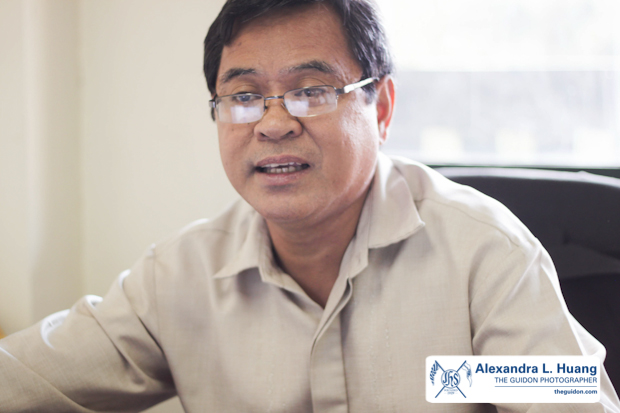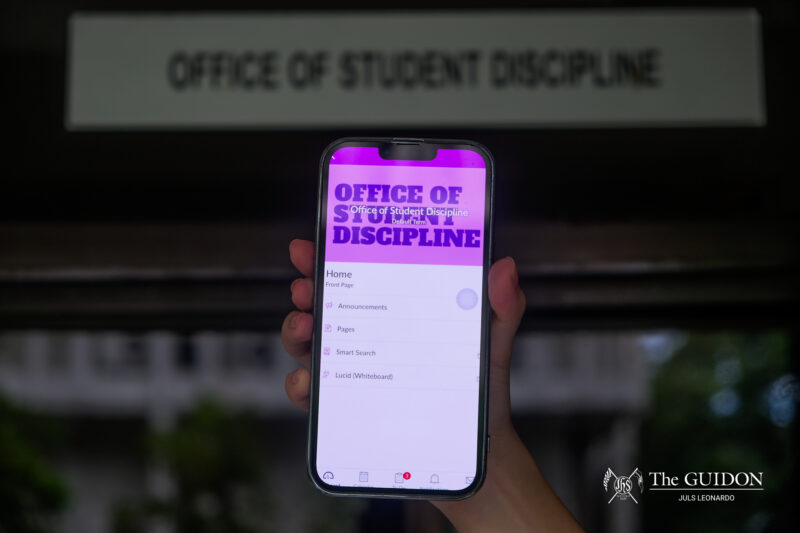
AN EXPECTATION OF EXCELLENCE. William Malitao of ChED said that with the extension of the CoE and CoD grants, he expects the concerned departments from SoSE to continue performing excellently. Photo by Alexandra L. Huang
THE COMMISSION on Higher Education (CHED) has extended its recognition of several departments under the School of Science and Engineering (SOSE) as Centers of Excellence (COEs) and Centers of Development (CODs) to May 31, 2014. This is in line with CHED’s gearing up to change its criteria in choosing COEs and CODs for the next term.
According to CHED’s official website, COEs and CODs are either public or private higher education institutions which have demonstrated the highest degree or level of standard along the areas of instruction, research and extension.
Funding assistance for student scholarships, faculty development, library and laboratory upgrading, research and extension services, instructional materials developments and networking is given to identified COEs and CODs.
As of September 10, CHED’s Technical Panel for Science and Mathematics (TPSM) has extended the COE status of the following SOSE departments: Chemistry, Information Systems and Computer Science, Mathematics and Physics. The Biology and Environmental Science departments, meanwhile, continue to be CODs.
“We’re comparable. In fact, in some [aspects], we’re better,” said SOSE Dean Evangeline Bautista, PhD on the programs being offered by SOSE. She said that the COE and COD recognitions further added to the prestige of SOSE’s programs.
Without the extension, the COE and COD recognitions of the mentioned departments would have expired by 2011. SOSE would have needed a reapplication to maintain the COE and COD grants of its departments.
Prestige and opportunities
One of the main advantages of being declared a COD is the funding assistance received through the COD grant. Bautista said that this counts a lot when it comes to the research output by the faculty, one main criterion for a COE and COD application.
“Even with the rewards that Ateneo gives [to its faculty], the research is very expensive. [They] entail a lot of equipment,” Bautista said. She said that faculty members under departments identified as a COE or COD are given further financial assistance for their research work which the Ateneo can no longer provide.
The grant gives funding to teachers who go to trainings and seminars to improve not just their teaching ability but also their knowledge of their own fields. “So what do the students get? Hopefully a better faculty,” Bautista said.
Sophomore mathematics major Luis Silvestre said that he feels honored to be under the Mathematics Department. “[Everything] seems to be almost perfect on how [the Mathematics Department] is now so I think no changes are needed,” he said.
Silvestre added that the faculty is a huge part of the fact that the Mathematics Department has been identified as a COE. “Most of the professors are legendary and are really great,” he said. Silvestre also attributed the COE designation to the departments’ commendable facilities and technology.
Meanwhile, sophomore biology major Monica Carlos said that the Biology Department as a COD keeps true to its status.
“Well, for a student like me, I consider an air conditioner installed at one of our laboratory classrooms an improvement already,” she said.
“Curriculum-wise, our study program competes well with all the other biology departments in other institutions,” Carlos added. She commended the Biology Department’s faculty and equipment.
Bautista said, “The opportunities are there. It’s just a matter of us being able to take advantage of it. We’re doing our best. We do our job with or without the COE or COD tag, and it goes with the kind of work that we do. We don’t do it for the grant.”
Bautista believes that the titles are being given to recognize how well SOSE operates in the aspects of teaching and research. She also gave an assurance of quality education no matter what happens. “I think the Atenean would get the best that we can give with or without that title.”
Selection protocol
CHED Physical and Natural Sciences Division Chief William Malitao, EdD said that to be recognized as a COE or COD, an interested institution must first wait for the official call for application from CHED. They are then requested to conduct a self-evaluation and submit the necessary documents to their office.
“Once they have submitted their paper evaluation, we will schedule an ocular visit, or what we call the verification process,” said Malitao in a mix of English and Filipino.
He said that the main factors CHED is looking for in a department for it to be identified as either a COE or COD are the following: board examination performance, accreditation level of the school, faculty line-up, research output from the faculty and the school’s facilities.
A specific panel reviews the COE and COD applications of institutions. The TPSM handles the science and engineering courses.
COE and COD grants under this field are good for five years. Once the term is over, CHED will call for a necessary reapplication.
Backsliding from a COE down to a COD status may occur if an identified institution fails to meet the criteria.
Malitao said that with the extension of the COE and COD grants, he expects the concerned departments from SOSE to continue performing excellently.
“Ateneo is also identified as an autonomous institution, so we’re really expecting [Ateneo] to excel in [its] programs,” he said.
As of press time, SOSE is already making the necessary preparations for the Philippine Accrediting Association of Schools, Colleges and Universities (Paascu) accreditation of its graduate level programs in 2014. That would also be the year SOSE would need to reapply for both the COE and COD grants.
“COE, COD and Paascu, it’s the same thing… We’ll definitely reapply [for COEs and CODs]. Hopefully, we can move the CODs to COEs,” Bautista said.







